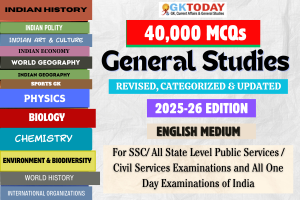Indian Polity & Constitution MCQs
Indian Polity & Constitution Objective / Multiple Choice (MCQs) Questions for Preparation of SSC-CGL, UPSC Civil Services, NDA, CDS, Railways and State Level Public Services Examinations.
31. Who can hear the first appeals from the orders and judgments of the district courts, additional district courts and other subordinate courts?
1. Supreme Court
2. High Court
Select the correct option from the codes given below:
1. Supreme Court
2. High Court
Select the correct option from the codes given below:
32. Which of the following included in free legal services?
1. Payment of court fee, process fees and all other charges payable or incurred in connection with any legal proceedings.
2. Providing service of lawyers in legal proceedings.
3. Preparation of appeal, paper book including printing and translation of documents in legal proceedings.
Select the correct option from the codes given below:
1. Payment of court fee, process fees and all other charges payable or incurred in connection with any legal proceedings.
2. Providing service of lawyers in legal proceedings.
3. Preparation of appeal, paper book including printing and translation of documents in legal proceedings.
Select the correct option from the codes given below:
33. Which of the following can organize Lok Adalats?
1. State Legal Services Authority
2. District Legal Services Authority
3. Supreme Court Legal Services Committee
4. Taluk Legal Services Committee
Select the correct option from the codes given below:
1. State Legal Services Authority
2. District Legal Services Authority
3. Supreme Court Legal Services Committee
4. Taluk Legal Services Committee
Select the correct option from the codes given below:
34. The state legislature can make which of the following provisions for the panchayats?
1. Levy, collect and appropriate taxes, duties, tolls and fees.
2. Provide for making grants-in-aid to the panchayats from the consolidated fund of the state.
3. Provide for constitution of funds for crediting all moneys of the panchayats.
Select the correct options from the codes given below:
1. Levy, collect and appropriate taxes, duties, tolls and fees.
2. Provide for making grants-in-aid to the panchayats from the consolidated fund of the state.
3. Provide for constitution of funds for crediting all moneys of the panchayats.
Select the correct options from the codes given below:
35. When was the Income Tax Appellate Tribunal established?
36. Which of the following allots election symbols to political parties?
37. Where is the headquarters of Development Monitoring and Evaluation Office (DMEO)?
38. What is the term of office of elected members of the board of cooperative societies?
39. The 102nd Amendment Act of 2018 empowered which of the following to specify the socially and educationally backward classes in relation to a state or union territory?
40. The Indian Institute of Management Act was enacted in which year?
 These questions are part of GKToday's 40,000+ GK Questions Course in GKToday Android Application which provides more than 40K questions with explanations suitable for all Competitive Exams of India.
These questions are part of GKToday's 40,000+ GK Questions Course in GKToday Android Application which provides more than 40K questions with explanations suitable for all Competitive Exams of India.
